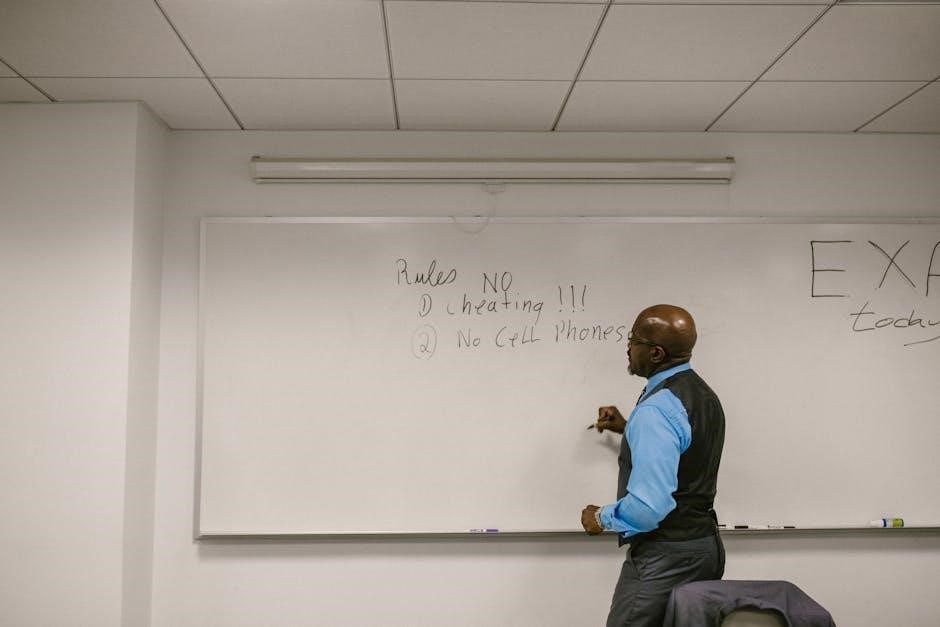The Notice of Intent is a required document for parents intending to homeschool their children in Virginia, ensuring compliance with state homeschooling laws. It must be filed annually by August 15th and outlines the educational plan for the upcoming school year. This document is a formal declaration of intent to provide home instruction and is essential for legal compliance, allowing parents to take control of their child’s education while adhering to state regulations.
1.1 Overview of Homeschooling in Virginia
Homeschooling in Virginia is governed by Code §22.1-254.1, requiring parents to file a Notice of Intent by August 15th annually. This process ensures compliance with state laws, allowing parents to provide home instruction while maintaining educational standards. The law mandates a structured approach, including curriculum submission and evidence of progress, while offering flexibility in teaching methods and materials.
1.2 Importance of Filing a Notice of Intent
Filing a Notice of Intent is crucial for legal compliance, ensuring parents meet Virginia’s homeschooling requirements under Code §22.1-254.1. It confirms eligibility, outlines the curriculum, and provides accountability. Failure to file may result in legal consequences, emphasizing the necessity of timely submission by August 15th to maintain homeschooling privileges and avoid potential penalties or disputes with local authorities.

Legal Requirements for Homeschooling in Virginia
Homeschooling in Virginia requires filing a Notice of Intent annually under Code §22.1-254.1; This ensures compliance with state laws and provides a structured educational framework.
2.1 Code of Virginia § 22.1-254.1
Code §22.1-254.1 governs homeschooling in Virginia, requiring parents to notify their local school division superintendent annually by August 15th. It mandates compliance with one of four educational qualifications and submission of evidence of progress by August 1st. The law ensures structured homeschooling while allowing flexibility in educational approaches and documentation methods.
2.2 Filing Deadline: August 15th
The Notice of Intent must be submitted annually by August 15th to the local school division superintendent. Missing this deadline may result in your child being considered truant. Timely filing ensures compliance with Virginia homeschooling laws and avoids potential legal complications, making it essential to prioritize this deadline for uninterrupted homeschooling privileges.
2.3 Required Documentation
The Notice of Intent must include specific documentation to verify eligibility for homeschooling. Parents must provide evidence of their ability to teach, such as a high school diploma, teaching credentials, or a curriculum description. Additionally, a list of subjects to be studied and parental certification are required to ensure compliance with Virginia homeschooling laws. Proper documentation ensures legal validity.
Methods of Submitting the Notice of Intent
Parents in Virginia can submit a letter stating their intent to homeschool, use the VaHomeschoolers Optional NOI Form, or a school division-provided form. The law does not require an official form, allowing flexibility for homeschoolers.
3.1 Using a Letter to Declare Intent
A letter is a common method to declare intent, outlining the parent’s decision to homeschool. It must include child details, a list of subjects, and eligibility criteria, such as parental qualifications or curriculum plans. This approach is popular due to its simplicity and flexibility, allowing parents to avoid potential issues with outdated or inaccurate official forms.
3.2 VaHomeschoolers Optional NOI Form
The VaHomeschoolers Optional NOI Form offers a structured alternative to traditional letters. This form is designed to ensure compliance with Virginia homeschooling laws, providing clear sections for parent certification, subject lists, and evidence of eligibility. It serves as a helpful resource for families seeking a straightforward method to fulfill legal requirements efficiently and accurately.
3.3 School Division-Provided Forms
School Division-Provided Forms are official documents distributed by local school districts. These forms typically include detailed sections for parental certification, subject lists, and eligibility evidence. While they offer a structured approach, some homeschoolers find them restrictive. Parents are encouraged to verify the accuracy and update status of these forms before submission to ensure compliance with Virginia’s homeschooling regulations.

Components of the Notice of Intent
The Notice of Intent must include a parent or guardian certification, a list of subjects to be studied, and evidence of eligibility to homeschool, as required by Virginia law.
4.1 Parent or Guardian Certification
The Notice of Intent requires the parent or guardian to certify their eligibility to provide home instruction. This involves selecting one of four options: a high school diploma, teaching credentials, a correspondence program, or a written statement of ability. The certification must include a signature and contact information for verification purposes, ensuring accountability and compliance with Virginia homeschooling laws.
4.2 List of Subjects to be Studied
The Notice of Intent must include a list of subjects to be studied during the upcoming school year. This list is for informational purposes only and should align with Virginia’s educational standards. Parents must submit this list along with their NOI by August 15th each year, ensuring transparency and compliance with homeschooling requirements.
4.4 Evidence of Eligibility to Homeschool
Parents must provide evidence of eligibility to homeschool, such as a high school diploma, teaching certification, or proof of a correspondence course. This documentation demonstrates compliance with Virginia’s homeschooling requirements and must be submitted annually by August 15th to ensure legal validation of the homeschooling program.

Submission Process and Guidelines
The Notice of Intent must be submitted to the local school division by August 15th. Parents can mail or email the document, with certified mail recommended for confirmation of delivery. Ensure all required information and attachments are included to avoid delays in processing. Adherence to these guidelines ensures compliance with Virginia homeschooling regulations.
5.1 Mailing Instructions
The Notice of Intent should be mailed to the local school division superintendent. Use certified mail with a return receipt for proof of delivery. Include the completed NOI form, required attachments, and a self-addressed, stamped envelope. Clearly mark the envelope as “Notice of Intent to Provide Home Instruction.” Verify the mailing address with your local school division to ensure proper delivery and processing.
5.2 Contact Information for Local School Divisions
Contact information for Virginia’s school divisions is available through the Virginia School Division Directory. Each division provides its own contact details, typically found on their official website. Parents can search by locality to find the correct superintendent’s office for submitting the Notice of Intent. Ensure the NOI is mailed to the correct address to avoid processing delays.
5.3 Deadline Compliance
The Notice of Intent must be submitted by August 15th annually to comply with Virginia homeschooling laws. Late submissions may result in legal issues or delays in recognition. Parents must ensure timely filing to maintain compliance and avoid potential consequences related to homeschooling status. Proper deadline adherence is crucial for uninterrupted home instruction.
Consequences of Not Filing the Notice of Intent
Failing to file the Notice of Intent can result in legal consequences, including truancy issues and complications with homeschooling status, as it demonstrates non-compliance with Virginia homeschooling laws.
6.1 Legal Implications
Failing to file the Notice of Intent can lead to legal consequences, including truancy charges, as the school division may not recognize homeschooling without proper notification. Virginia law requires compliance with Code of Virginia § 22.1-254.1, and non-filing may result in legal penalties and complications with homeschooling status, emphasizing the importance of adherence to state regulations.
6.2 Impact on Homeschooling Status
Failing to file the Notice of Intent can result in the homeschooling status not being officially recognized by the school division. Without this notification, the child may be considered truant, and homeschooling efforts may be disregarded. This can lead to complications in maintaining homeschooling rights and may require additional steps to establish compliance with Virginia homeschooling laws.
Additional Resources and Support
Virginia homeschooling organizations, school division directories, and online forms provide essential support. Contact local divisions for guidance, or use resources like the VaHomeschoolers Optional NOI Form for assistance.
7.1 Virginia Homeschooling Organizations
Virginia homeschooling organizations offer valuable support and resources for families. Groups like VaHomeschoolers provide optional NOI forms, guidance, and advocacy. These organizations often host events, workshops, and webinars to assist parents in navigating homeschooling requirements and best practices. Their websites and directories are excellent sources for finding local support groups and accessing helpful materials for a successful homeschooling experience.
7.2 School Division Directories
School division directories are essential resources for homeschooling parents in Virginia. They provide contact information for local school division superintendents, mailing addresses, and specific requirements for submitting the Notice of Intent. These directories ensure parents can comply with filing deadlines and procedures, making the homeschooling process smoother and more efficient.
7.3 Online Forms and Templates
Online forms and templates for the Notice of Intent are readily available, simplifying the process for Virginia homeschooling parents. Websites like VaHomeschoolers offer optional forms, while school divisions provide specific templates. These resources ensure compliance with legal requirements, making it easier for parents to submit accurate and complete documentation. They also reduce the complexity of understanding legal jargon.
Annual Renewal and Updates
Parents must renew their Notice of Intent annually by August 15th to continue homeschooling. Updates to the notice are required if there are changes in the child’s status or educational plan.
8.1 Renewal Process
The renewal process requires submitting an updated Notice of Intent by August 15th each year. Parents must recertify their eligibility and provide a revised list of subjects. failure to renew may result in legal consequences. the process ensures ongoing compliance with homeschooling laws and maintains the child’s homeschooling status. timely renewal is crucial for uninterrupted home education.
8.2 Updating Information
Parents must update their Notice of Intent if changes occur, such as a new address, curriculum adjustments, or eligibility criteria. Updates ensure the school division has accurate records. Failure to update may lead to non-compliance issues. Parents should submit revised information promptly, maintaining clear communication with their local school division throughout the homeschooling journey.

Evidence of Educational Progress
Virginia requires parents to submit evidence of educational progress by August 1st following the school year. This ensures children are achieving academic milestones and meeting legal standards.
9.1 Requirements for Submission
Parents must submit evidence of educational progress by August 1st following the school year. This includes standardized test scores, evaluations by certified teachers, or portfolios of work. The evidence must demonstrate academic achievement and adherence to Virginia’s homeschooling standards. Additionally, parents must include a list of subjects studied and a description of the curriculum used, ensuring compliance with state regulations. A certification of accuracy is also required.
9.2 Accepted Forms of Evidence
Virginia accepts standardized test scores, evaluations by certified teachers, or portfolios of the child’s work as evidence of educational progress. These documents must demonstrate the child’s academic achievement and adherence to the curriculum outlined in the Notice of Intent. The evidence should be submitted by August 1st following the school year.
Special Considerations
Homeschooling in Virginia includes special considerations such as religious exemptions and provisions for children with special needs. Parents must comply with specific legal requirements for these cases, ensuring proper accommodations and documentation as outlined in state laws.
10.1 Religious Exemptions
Religious exemptions allow families to homeschool without filing a Notice of Intent if their beliefs oppose public or private education. This exemption is protected under Virginia law, ensuring families can prioritize religious values in education without additional documentation, though they must still provide an adequate education as defined by state standards.
10.2 Children with Special Needs
Virginia law allows parents of children with special needs to homeschool by filing a Notice of Intent, ensuring tailored education. Parents must provide evidence of progress annually, adapting instruction to meet their child’s unique requirements. The law offers flexibility, enabling personalized learning plans that cater to special needs, while maintaining compliance with state homeschooling regulations. Additional resources may be available to support such families.
Filing the Notice of Intent is a crucial step in homeschooling in Virginia, ensuring compliance with state laws. Submit by August 15th, use official forms or letters, and verify requirements. Stay informed about legal updates and seek support from homeschooling organizations to ensure a smooth experience. Proper documentation and timely submissions are key to avoiding issues. Stay organized and proactive to maintain homeschooling privileges effectively.
11.1 Best Practices for Filing the NOI
Submit the Notice of Intent by August 15th, ensuring accuracy and completeness. Use a letter or official form, including required documentation like subject lists and eligibility proof. Double-check for errors, use certified mail for submission, and maintain a copy for records. Stay informed about legal updates and verify local school division requirements to ensure compliance and avoid delays.
11.2 Staying Informed About Homeschooling Laws
Regularly review Virginia homeschooling laws and updates to ensure compliance. Utilize resources like VaHomeschoolers and local school division websites for accurate information. Stay informed about deadlines, documentation requirements, and legal changes to maintain homeschooling eligibility and avoid potential issues. Awareness of current laws helps parents provide a compliant and effective home education program for their children.



